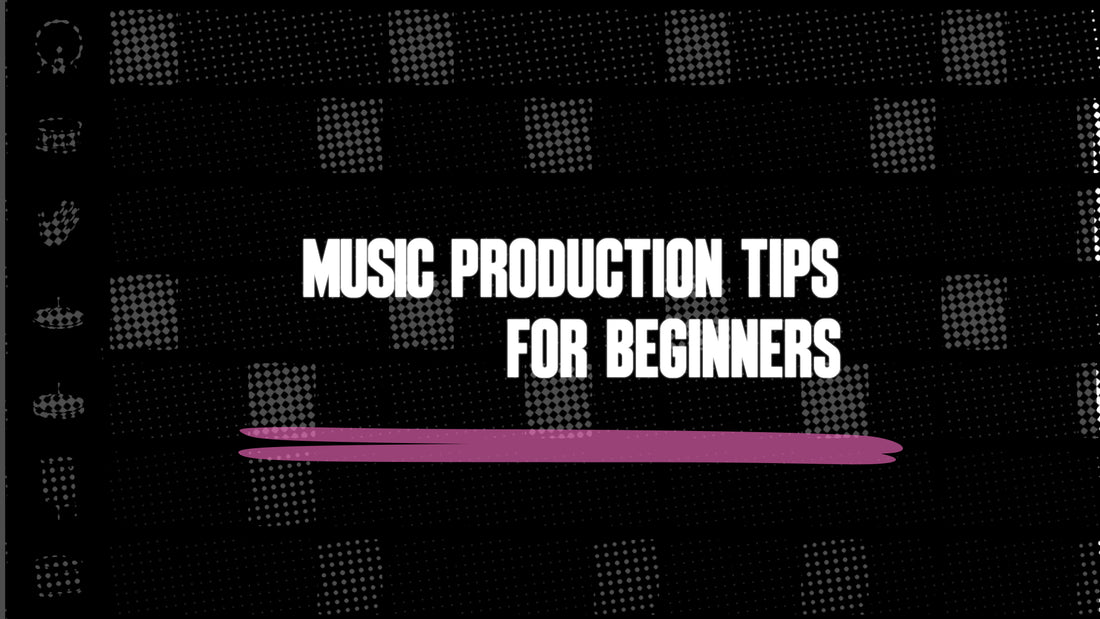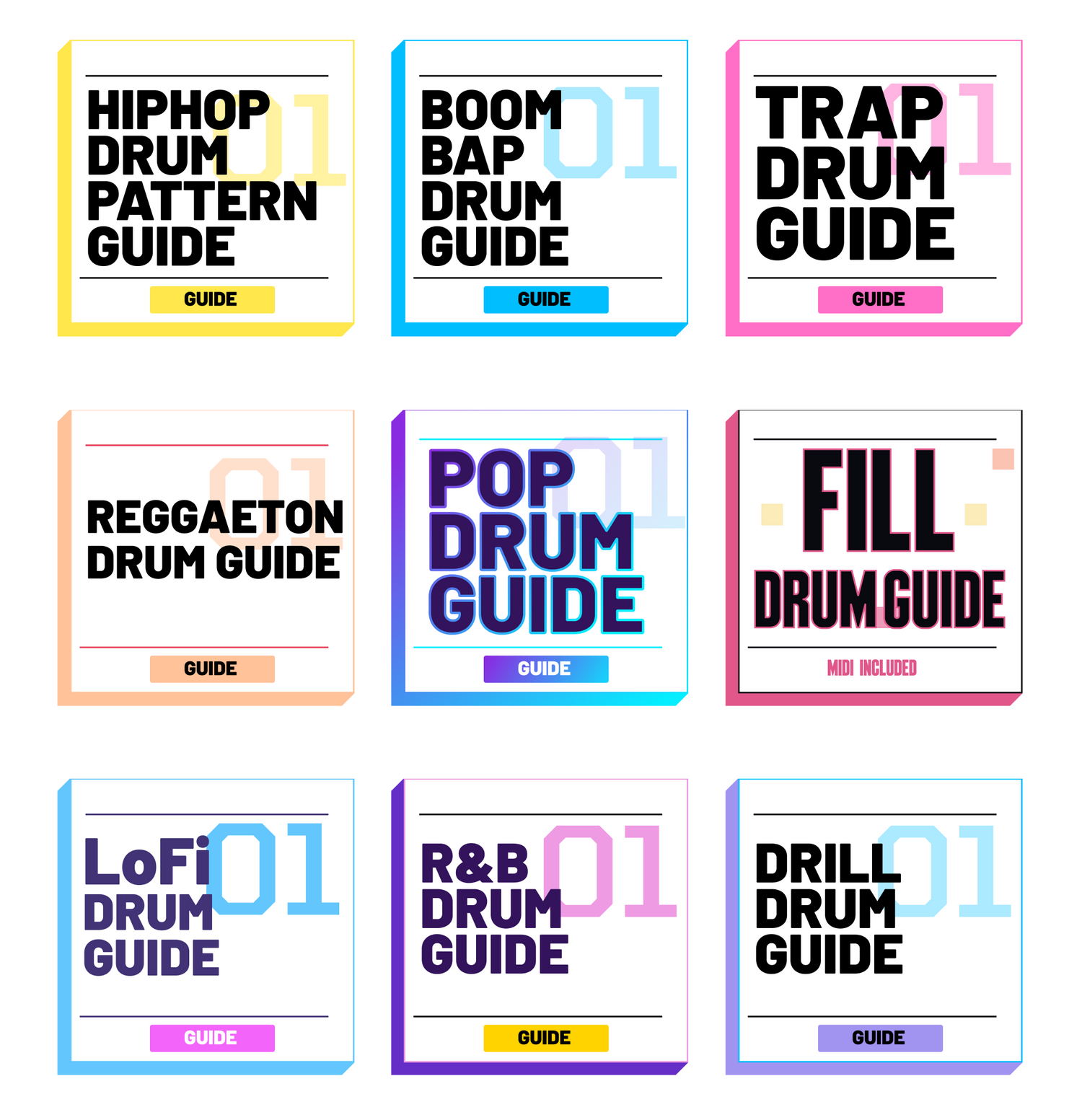When I got my first legit 9-5 job I bought myself a new laptop. A mac to be exact. And it literally changed my life all because it has this little music app called GarageBand.
GarageBand was a game changer. I went from thinking about making beats to my first beat in the same day.
But, looking back on it, I realized I was in over my head. I didn't know anything about music production. I just knew I liked hip hop and thought it would be cool to make a beat like Timabland, Kanye, or DJ Premier.
I wish someone gave me music production tips for beginners to help me get started. Instead I kind of stumbled my way through.
So with that being said, I thought I would put together a list of music production tips for beginners. Things older Cole would have told younger Cole when he was starting out.
Let's dive in
Keep It Simple With The Gear To Start
Don’t overdo it on gear and spending up. There’s no shortage of items to spend your money on: from MIDI keyboards, to sample packs, to VSTs and controllers. It can add up in time and cost.
You're better off sticking with your DAW and few other pieces of equipment.
To start as a beginner keep it simple. A laptop/desktop with a DAW. If you’re on a MAC, use GarageBand. FL Studio or Serato Studio are also both great options as well for mac or PC.
FL Studio has a lot going on, but there are a ton of tutorials you can find online to get up to speed. In particular you'll find a lot of music production tips for beginners specifically for FL Studio.
Serato Studio is more of a beat making software and not full music production suite like Pro Tools or Apple Logic Pro X. But I find that to be super nice since 1)it's not bloated with features and 2) it makes it very approachable, and 3) it's easy to learn.

And the great thing about GarageBand, FL Studio or Serato Studio is they are still powerhouse DAWs. Great for beginners but powerful enough to carry you through being a seasoned pro. So if you're worried you'll outgrow your DAW, don't worry, you won't.
A set of headphones and studio monitors will be needed. You can’t rely on your computer speakers. In general, you can find a good pair of headphones for around $100.
And if you’re recording vocals, get a cheap vocal mic and some treatment to soundproof your room.
After a while when you're more of an intermediate you'll figure out where you should upgrade and spend your money on better gear.
Pick Your DAW and Learn Your DAW
I see some blogs videos saying the best thing to do is master your DAW. This is a lofty expectation. DAWs, even the simpler ones, are extremely feature rich and complex.
You're never going to master your DAW as a beginner. In fact, I would go as far as saying:
You're never going to master your DAW. Period, end of sentence.
The great news is you don't have to. All you have to do is learn the basic user flows.
Stuff like adding in samples, editing MIDI in the piano roll, arranging tracks to form a song, loading plugins, and basic mixing. You'll learn the ins and outs and depths of the DAW as you go.
But to start, just look for simple tutorials for learning the basic flows.
Beginner pro tip: keep track of the keyboard shortcuts as you learn them. They will be game changers for speeding up your workflow.

You Don't Need All Those VSTs and Plugins
Here's a real lesson that cost me thousands of dollars to learn: as a beginner, you don't need all those plugins. You think you do. You think if you get your hands on that shiny new Horn VST your beats will sounds like something Jeezy would want to rap on. I legit thought that and bought Mojo Horns thinking so.
No.
The plugins and VSTs are going to make your beats sounds better if you don't know how to work with what you already have. Learn the basics of the stock plugins and effects. Really understand them and how you can shape, sculpt, and design sound.
And as I talk about in the next section, learn basic music theory.
As you progress and get better, then yes it'll be time to upgrade and get high quality and custom plugins.
If you're eager to get your hands on VSTs, try free ones like Spitfire Labs Drums to get started.
Learn The Basics of Music Theory
You don't have to be a pro here and be able to identify the most obscure chords by ear.
Familiarize yourself with the basics of music theory, including scales, chords, and keys. Understanding these fundamentals will help you create more musical and harmonically pleasing compositions.
Beginner pro tip: take piano lessons to help you get up to speed on creating music.
Keep It Simple
When you want to learn music production you probably want to make tracks like you're favorite artist. You'll feel that pressure. But my advice on music production tips for beginners is to keep it simple.
Just pick a genre and go from there. Instead of saying "I want to make beats just like DJ Premier" say "I'm going to make a boombap beat". Instead of "I'm making a Metro Boomin type beat" say "I'm going to make a trap beat".
Begin with simple projects to avoid feeling overwhelmed. Experiment with basic melodies, drum patterns, and arrangements before diving into more complex compositions.
Follow this basic structure:
- Bassline
- Drums
- Chords
- Melody
Think about a song in those four parts. Make songs in those four parts and you'll be better off. And if you haven't learned chords yet, use Ripchord, a free chord generator.
Most songs can be broken down into those sections.
Another framework approach this is heavily sampling. So your song is simply:
- Sample
- Drums
- (and maybe a bassline or melody depending on the sample)
Here you are using a sample and then adding drums to fill it out.
Simple Arrangements
In a similar fashion you don't need to go crazy with making fancy song arrangements. Have a simple intro, verse, hook, bridge, and outro. That's it
Bonus Tip: pick a genre and way of producing and stick to it. Say you decide to be a BoomBap producer who samples. Cool, do that. And get great at it.
You'll occasionally feel like you need to learn how to play keys, or want to become a trap producer. Don't bounce around until you're good at Boombap and sampling. Then branch out.
If you start to branch out before you developed a solid foundation in one area you'll never truly progress.
Learn MIDI and the Piano Roll
Most DAWs have a form of a piano roll and MIDI notes. Get comfortable with adding, removing, modifying MIDI notes.
Besides actual audio files, MIDI is the core of making up a song.

Learn Basic Effects
Most modern music has basic effects applied to it. Music straight out the DAW can sound cold and sterile. Learning to use simple effects will go a long way. A few to look into
- Reverb
- EQ'ing
- Compression (including side-chain compression)
- Saturation
- Synth Basics (oscialltor, LFO, Filter, Resonance, ADSR)
- Swing for drums
Understand Mixing Basics
Learn the basics of mixing, including volume balancing, panning, and EQ. These skills are crucial for creating a clear and well-balanced mix.
You don't have to be a mix engineer or use the latest and greatest plugins. Understanding the above concepts will get you 80% there. And really 100% there for what you need to understand as a beginner.
When I first got comfortable with making beats daily I thought I needed a mix engineer to make the final. In reality, I just needed to understand the basics listed above to finish my tracks.

Use Reference Tracks for Inspirations
Listen to music in the genre you're interested in and analyze the production. Pay attention to the arrangement, sound choices, and overall mix. Use these tracks as references for your own work.
The key here is references and inspiration. Do not try to recreate them. You'll be disappointed if you try to make something that sounds exactly like what Timbaland did or Metro Boomin. Just create something inspired by them.
Learn the Drums of Your Genre
So much of the genre of the music is determined by the drums. Getting the right drum sounds and drum patterns will get you to where you need to be.
Here are 10 drum patterns you need to know.
A side note: when I was first learning how to make beats, I came across The Beat Tips Manual. In there, they described a few drum patterns. That really helped me because I only really knew one or two.
But I wanted to know more and to make better drum patterns.
So fast forward it's one of the reasons I created MIDI Mighty. I created the MIDI drums and guides that my younger self needed.
We're Talking About Practice
Like any skill, music production improves with practice. Dedicate regular time to producing music, even if it's just a few hours each week. Consistency is key to improvement.
As far as music production tips for beginners, this might be the most important. Remember to practice. Practice means learning something and repeating it until you have a solid grasp on it. Keep learning, keep trying and refining your skills.
Join Music Production Communities
Join online forums, communities, or social media groups related to music production. Connect with other producers, ask questions, and share your work for feedback. The music production community can be a valuable resource for learning and inspiration.
Reddit is a good place for like minded people on producing.
Proactively Watch Tutorials
Take advantage of online tutorials. Many platforms offer free tutorials covering various aspects of music production, from beginner to advanced topics.
Obviously Youtube is the go to choice here. But I want to talk about being proactive and what that means.
It means find out what you want to learn and search that. If you want to learn how to use saturation and what it does, then search that, learn and then go apply it.
The thing about Youtube is they'll recommend many similar videos. And before you know it your homepage is filled with beat making videos. And those videos will wildy vary in range and style.
So you might be interested in being a sample beat maker for Boombap beats, but Youtube will show you an artist making drill beats. Next thing you know you're thinking "maybe i should make drill beats". Stay focused.
Find what you want to learn, learn it, then go apply it.
Don't Listen To Your Beats For A Long Time
Ok this sounds counter-intuitive i know, but hear me out. You want to make beats, get feedback, and then shelf those beats.
Here's the thing: those beats are going to suck.
Just keep moving forward and keep making new beats.
Then a month, 3 months, even a year later, go back to those beats and see how far you came along.
Be Patient And Enjoy The Process
Music production is a journey, not a destination. Be patient with yourself, celebrate small victories, and most importantly, enjoy the creative process.
Remember these music production tips for beginners and all will be well.
Fading Out - The Journey
Remember, there's no fixed path in music production, and everyone develops their unique style over time. Stay curious, be open to learning, and have fun exploring the vast world of music production!

